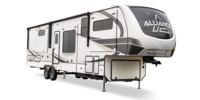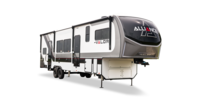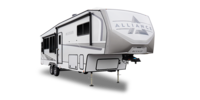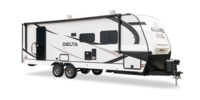For some travelers, wintering in an RV can lead to quiet(er) campgrounds, seasonal activities such as ice fishing or skiing and serene, snowy settings. Before embarking on your next below-freezing excursion, it’s critical to prepare your RV for traveling in the winter. Consider these helpful tips to ensure your vehicle and cargo are cared for during colder months.
Winterize
Whether you do it yourself or enlist professional services, RVs should be winterized if the vehicle will consistently encounter temperatures below 32 degrees Fahrenheit. For those seeking to live in an RV throughout the season, full winterization may not be an option as the vehicle will lose function of plumbing and water systems.
- Empty grey-, black- and fresh-water tanks.
- Drain the water heater (be sure the water is cooled and not under pressure) and water lines while disabling plumbing; if left full, pipes can burst as water freezes.
- Electric heat tape can be wrapped around pipes for an additional layer of freeze prevention.
- Antifreeze can be added to holding tanks and pumped through water lines. Locate the water heater bypass valve to avoid pumping antifreeze into the heater. Most newer models come equipped with such a system. If any antifreeze enters the water heater, it will require draining.
- If the trip is short, winterization may not be necessary. Instead, gently running water throughout the night should prevent pipes from freezing.
- When renting an RV in a cold-weather state, fleets should already be winterized though it’s recommended to ask.
Determine Heat Source and Dehumidify

Determining an RV heat source will depend on the capabilities of a campsite. If the site is hooked up to electricity, an electric heater is the safest, most cost-effective option for maintaining temperature in the close quarters of an RV.
- Avoid using onboard heat systems, if possible, which drain propane. However, portable propane heaters can be a used as an alternative, consuming less gas. Test any smoke or carbon monoxide detectors as well.
- As heat collects inside an RV during the colder months, condensation and humidity can lead to mold. Running a dehumidifier can reduce the moisture level and help prevent the growth of mold and mildew.
Insulation
There are several aftermarket accessories at hand to help with insulating RVs for winter use.
- Vent insulators and skylight covers help retain rising heat.
- Assess the vehicle’s windows and cover with plastic film wherever possible, a cheap option for preserving comfort. Thermal curtains can also be an additional barrier.
- RV skirts cover the gap between the ground and vehicle, enclosing the RV underbelly and protecting its components from freezing air. Skirts are produced in a range of customizable styles, kits and materials, including vinyl and foam.
Tires
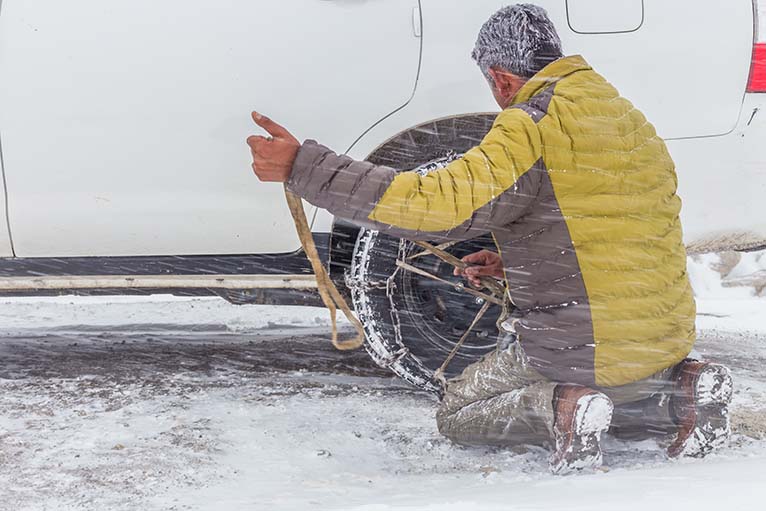
Equipping an RV with correct tires is essential in winter conditions. As most RVs are rear-wheel drive and require longer distances for braking than most other vehicles, improper or worn tires can pose an even greater hazard to drivers.
If an RV isn’t outfitted with snow tires, snow chains can serve as an alternative. Routes and campsites should be reviewed prior to travel, as some locations don’t allow for chains while others may require them. Additionally, some rental companies may not allow snow chains; check before booking. Keeping a spare tire on board is also recommended.
General Maintenance
RVs require general under-the-hood maintenance to operate smoothly in sub-prime conditions. Check oil and coolant levels before long hauls and examine battery terminals for signs of corrosion. Woes from a weak battery or poor connections during the winter can be avoided with a once-over. If possible, keep fuel levels above 50 percent; doing so helps mitigate ice crystals developing on the tank due to condensation.
Stock Up
Before the wheels turn on a winter adventure, stocking up on seasonal supplies is as vital as preparing a road-ready vehicle. When taking inventory, think about bringing items that combat the cold and aid in worst-case scenarios.
- canned/nonperishable food
- blow dryer (helps defrost components in a pinch)
- extra water
- snow shovel/scraper
- extra propane
- hand warmers
- thermal blankets, slippers, sufficient outerwear
- headlamps (nighttime arrives earlier in the winter months)
- ice melt
- flat patch kit
- one of Alliance RV’s recommended RV apps


